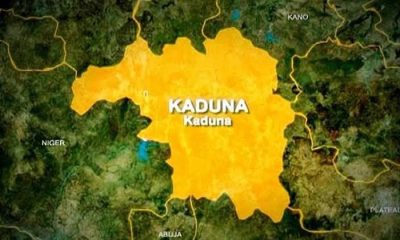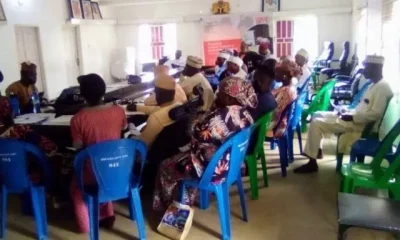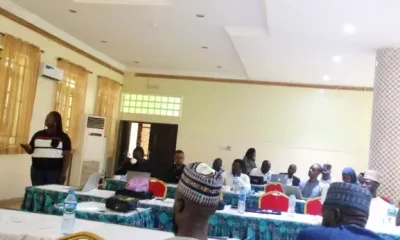News
Network restates committment to support Kaduna IRS on progressive tax regime
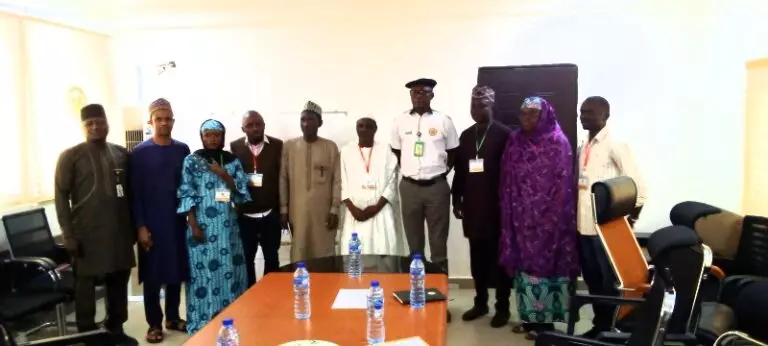
(Photo: 7th from L-R: Acting Executive Chairman of KADIRS, Mr Jerry Adams and the Coordinator of TJN Mr Simeon Olatunde in a group photograph with members of staff of KADIRS and TJN entourage on Thursday in Kaduna)
The Tax Justice Network (TJN) has restated its commitment to support the Kaduna State Internal Revenue Service (KADIRS) for fair, just, equitable and progressive tax regime in the state.
The TJN is an association of individuals and groups interested in engaging issues related to tax justice and promoting a fair, just, equitable and progressive tax regime in Nigeria.
It has a spread across the sub-national level.
Coordinator of the network in Kaduna, Mr Simeon Olatunde, made the committment at a familiarisation visit to the Acting Executive Chairman of KADIRS in Kaduna.
Olatunde noted that the association had, in the previous administrations, helped the KADIRS in publishing and distributing Hausa tax handbooks and rebuilt Lere grain market.
He added that the network also organised media engagements, trained the KADIRS staff on redress mechanisms among other engagements aimed at ensuring progressive tax regime.
He said that with support from Christian Aid, Partnership to Engage Reform and Learn, (PERL), Actionaid and OXFAM, among other funders, partners and supporters, they were able to carry out activities in line with the TJN objectives.
Olatunde therefore said the network was poised to increase domestic resource mobilisation to sustainably finance development.
He also said they were poised in campaigning for more fair and progressive tax policies in Kaduna to reduce multiple taxation, corporate tax dodging and other harmful tax practices in the state.
Olatunde, however, lamented that there wa huge capacity gap between the tax administrators at the local and state level and continued apathy of citizens on governance and taxes.
He also lamented that only few organisations were interested in tax justice, due to poor tax knowledge and weak synergy between TJN and KADIRS as well as other revenue generation agencies.
The coordinator called on the government to invest more in technology in a way that appealed to the
informal sector that would help capture it into the tax net.
He also urged the government to develop Kaduna tax policy/ implermentation framework to strengthen transparent and accountable service delivery.
It should also strengthen a feedback mechanism where taxpayers can track the update of some of the concerns raised through any of the communication paths.
“Kaduna State Internal Revenue Service should provide toll-free lines to ease the
cost of tax payments on taxpayers and
revive the Ease of Doing Business Committee in the state,” he said.
He commended the KADIRS for its recent arrest of six gang members of illegal tax collectors in the state.
Earlier, the Acting Executive Chairman of the KADIRS, Mr Jerry Adams, said they had done a lot in ensuring seamless tax administration in the state.
Regarding awareness creation and monitoring, he said they could not do it alone unless with the help of CSOs like the TJN and many others.
Adams noted that ordinarily, people did not like paying tax, adding that the attitude was not peculiar to Kaduna but the entire nation and developing countries in general.
He, therefore, said that for people to pay tax, they needed to know why they were paying it.
“When the people pay tax, they become stakeholders and ask questions on what the money is used for,” he said.
The acting executive chairman described the governor of the state, Sen. Uba Sani, as a wellfarist, stressing that his policies came with human face.
On that premise, he said they were trying on making the tax regime flexible to ensure that people complied voluntarily.
“In doing that, we need to create awareness as the people will know that there is a symbiotic relationship between them and the Government.
“When citizens pay tax, we give the government for them to use in development of the state.
“Paying tax by the people also attracts investment which will give birth to employment. The number of graduates our institutions are churning out is very high and government does not have the capacity to absorb them all.
“We want more private sector’s investment in the state, the government will not be able to meet up with its promises if people don’t pay tax,” Adams said.
News
Woman killed while crossing road in Anambra

The Federal Road Safety Corps (FRSC), Anambra State Sector Command, has confirmed the death of a woman in an accident at Okpoko Market on the Asaba-Onitsha Road.
The Sector Commander, Mr Adeoye Irelewuyi, who confirmed the accident to journalists in Awka on Thursday, said that the woman was hit while she was crossing the road.
He said that the accident, which occurred on Wednesday, involved a commercial tow truck with registration number XA550BMA.
“Eyewitness report reaching us indicates that the truck was towing a vehicle in an uncontrollable speed along the axis.
“The vehicle that was being towed got detached from the tow truck.
“It hit and killed a female adult, who was said to be crossing the road, while the tow truck continued its movement.
“FRSC rescue team came to the scene and took the woman to Toronto Hospital, Onitsha, where she was confirmed dead and her body deposited at the hospital’s mortuary,” he said.
While sympathising with the family of the dead, the sector commander urged motorists, especially tow truck drivers, to exercise a high level of professionalism.
He also urged the drivers to always use standard equipment and avoid speeding.
News
LASG’s maize palliative impactful, says poultry association chair

The Chairman, Poultry Association of Nigeria (PAN), Lagos State Chapter, Mr Mojeed Iyiola, said the state government’s maize palliative to members of the association made a positive impact on the sector.
Iyiola said this in an interview with the News Agency of Nigeria (NAN) on Thursday in Lagos.
“We received about 150,000 tons of maize in February from the Lagos State government as palliative to cushion the effect of high feed prices.
“The major benefit of the palliative is that it actually cushioned the cost of production for most poultry farmers in the state.
“The palliative was beneficial as it made the cost of some poultry produce, especially eggs to drop,” Iyiola said.
He noted that prior to the palliative, a crate of egg was sold between N3,500 and N3,700 at the farm gate, but after the palliative, it now sells between N3,200 and N3,400.
According to the PAN chair, retailers and middlemen who sell from N3,800 to N4,200 do that for their personal gain.
“We have urged our members to sell their eggs at reasonable prices following the receipt of the palliative from the government.
“We appreciate the Lagos State government for the palliative but we also urge the federal government to do likewise, to further reduce the cost of production in the sector.
“This will consequently lead to drop in the prices of all poultry produce across board,” he said.
He said the palliative was shared among financial members of the association at no extra cost.
“As an association we shared the grains equally across PAN’s eight zones in the state equally. We also mandated each zone not the sell even a grain of the maize.
“We, however, considered new poultry farmers who wanted to the join the association as beneficiaries of the palliative,” said Iyiola.
He noted that through the palliative, more poultry farmers were recruited into the association.
“The maize was shared only to poultry farmers and not feed millers, it is the major component of poultry feed formulation,” he said.
-

 Business6 days ago
Business6 days agoSeplat Energy celebrates a decade of Dual Listing with Bell Ringing Ceremony at Nigerian Stock Exchange
-

 News6 days ago
News6 days agoBDCs now buying dollar at ₦980 — ABCON President
-

 Metro6 days ago
Metro6 days agoOsun Poly Student, Olanrewaju Olatona killed by hit-and-run one-way driver
-
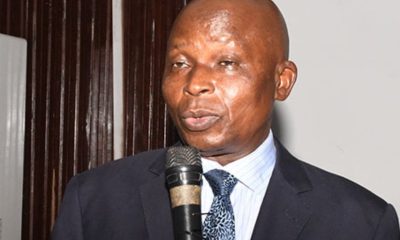
 Headline6 days ago
Headline6 days agoFagbemi warns against obstructing EFCC from performing its lawful duty
-

 News6 days ago
News6 days agoLASG’s maize palliative impactful, says poultry association chair
-

 News6 days ago
News6 days agoWoman killed while crossing road in Anambra





